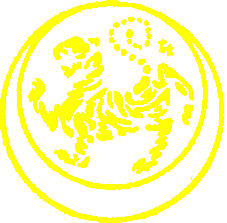
| Index. | Actividades | Quem somos | Kata | Fotos | Contactos | Novidades | Treino karate | Instructor | competir | outros |
|
|
|
|
History of karate |
||
|
|
It is said that karate goes back 5000 years and one of the first masters and pioneers of this art is Boudid Harama who lived in 525 B.C. He was a religious leader who first gained knowledge of the sciences of his time and then decided to teach religious belief to others. In order to do this, he started his journey alone from India and after walking for thousands of kilometers and passing through many challenges of nature arrived in China and took residence in a Shaolin temple in the state of Hunan. His teachings included extreme discipline and abstinence. He was in solitude and contemplation for 9 years while in caves and mountains. In order for his students to be able to endure long hours of contemplation and also confront aggressors, who saw religious men and their beliefs as a burden to them, he created 18 moves which in reality constitute the foundations of today’s karate.
|
|
|
ABE Keigo 9th Dan JSKA Chief Instructor |
||
|
ABE Keigo Sensei, founded the JAPAN SHOTOKAN KARATE ASSOCIATION the 10th February 1999. Abe Sensei holds 9th Dan in the Japan Shotokan Karate Association and is the JSKA Chief Instructor. It is one of the fastest growing Shotokan associations in the world. Abe Keigo Sensei was born in October 1938 in the town of Iyoshi in Ehime Prefecture on Shikoku Island in East Japan. Abe Sensei started Karate and Judo training when he was 15 years old. In 1956 he entered the Japan Engineering University in Tokyo from which he graduated in 1960. In 1958 Abe Sensei started to train at the Headquarters of the Japan Karate Association (JKA) where he met a young and powerful Sensei, NAKAYAMA Masatoshi Sensei, who was to become his grand master. Abe Sensei trained there every day for nearly 35 years. During this time, Abe Sensei was informed by Nakayama Sensei that Nakayama Sensei himself was taught by FUNAKOSHI Gichin Sensei as well as by his son FUNAKOSHI Yoshitaka. This is further reflected in the teaching of Abe Sensei and the JSKA. In 1965 Abe Sensei graduated as JKA instructor, progressing to become an important member of the JKA Headquarters’ instructors staff and in 1985 was appointed Director of Qualifications; in 1990, Abe Sensei was appointed Technical Director of the JKA (Matsuno section), a position held until retiring from the JKA (Matsuno section) on 31st January 1999, and on the behest of his students worldwide, forming the JSKA. Abe Sensei, through his unique position as senior student of Nakayama Sensei, is and will remain an integral part of the evolution of the Shotokan style. Abe Sensei has also taught and influenced some of the top Japanese instructors in the world to day, and headed numerous delegations in around 50 countries for the JSKA and the Japanese government. Abe Sensei is also one of the few Karate-ka to have refereed in the presence of the Emperor of Japan during a Japan national tournament. This is indeed a great honor in Japan and only highly respected Karate-ka might ever attain such a level of recognition. Abe Sensei has been also an official instructor with the Japanese Ministry of Education, Culture, Sports and Technology, a national referee for the JKF, and an international referee for the WKF/WUKO. When approached by Hollywood, Nakayama Sensei delegated Abe Sensei as fight consultant on the filming of the James Bond movie “You Only Live Twice”, an experience which remains one of Abe Sensei’s many fond memories. Abe Sensei was also an accomplished competitor and took 3rd place in the first JKA National Championship; was the Japanese team’s captain at the second WUKO World Championship in Paris, France; won 1st place in the team competition at the 1973 JKA International Friendship Tournament; and took 1st place in both the second and third JKF National Championships as a representative of Tokyo. A highly rated and dangerously competent fighter, Abe Sensei also devised the original rules for Ippon Shobu competition in a manner preserving the Budo spirit through the concept of “killing with one perfect, decisive blow”. Although not well known, Abe Sensei is also a fighter that kept Enoeda Sensei, the “Shotokan Tiger”, at bay, in 1961 at a major Japanese tournament. Enoeda Sensei was already well renowned for his skills, ferocity and strength, and the fight went on to six enchosen (extensions), Enoeda Sensei finally winning only on hantei (decision), a memorable fight which reflects Abe Sensei’s skills, technical abilities, spirit and tenacity in the Dojo and his humility outside. Abe Sensei has a great understanding of Karate history and philosophy through the formation and development of Shotokan style into what he perceives the future has to offer: “I feel that today’s Karate is centered only on winning competitions and everyone trains towards this end. But this is very far from the true purpose of Karate. I believe that the true purpose of Karate lies in daily training with a goal to develop in parallel a strong body and mind and furthermore to contribute to society in general; the Karate-do we practice has for essential purpose to attain a correct control of body and mind”. Abe Sensei established the JSKA to realize what he himself sees as the true purpose of Karate. The JSKA Karate philosophy is to
• Improve technique as a sport Karate-ka who understand these principles are most welcome to join us. Japan Shotokan Karate AssociationTokyo, May 2009
|
|